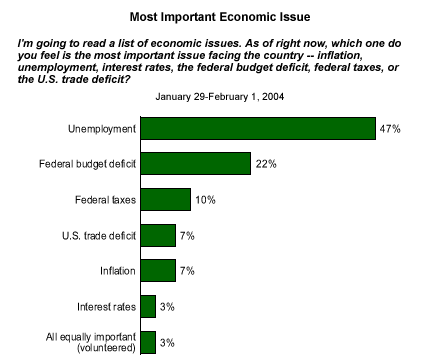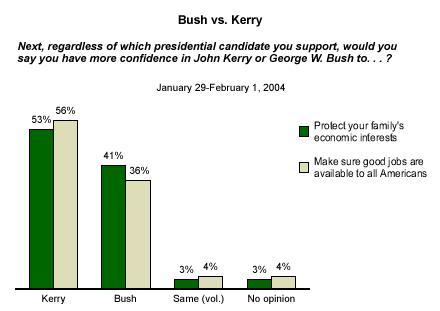Public approval of the way the president is handling the economy has undergone a complete reversal during the past month, according to a recent CNN/USA Today/Gallup poll. In a Jan. 2-5 poll*, the public approved of this aspect of the president’s job performance by a margin of 54% to 43%. But according to the Jan. 29-Feb. 1 poll**, 43% of Americans approve of Bush’s handling of the economy, while 54% disapprove.
Why the dramatic change in the way people perceive the president’s economic job performance? Will the new unemployment numbers from the Department of Labor improve this perception? Do people really believe that the president can affect the national economy and their personal economic situations?
Jobs a Key Issue
As the year began (Jan. 2-5), one in five Americans told Gallup they were worried that they or their spouse will lose a job within the next 12 months. Considering this high level of uncertainty about the jobs situation and its potential impact on the economy, it’s not surprising that in the recent survey, more Americans identify unemployment as the most important economic problem than any other issue tested. Nearly half of respondents (47%) say that "unemployment" is the most important economic issue facing the country -- more than twice as many as those who feel the federal budget deficit is the most important economic issue (22%), and nearly five times as many as those who feel this way about federal taxes (10%).

Bad News on Jobs
Last Friday, the Department of Labor reported that on a seasonally adjusted basis, the economy added 112,000 jobs in January. This is an extremely disappointing number, given that the GDP increased at an annual rate of 6% during the last half of 2003. Even with this increase, overall employment is currently lower than it was a year ago.
Making matters worse, a new report indicates that new layoff announcements totaled 117,556 in January. According to outplacement firm Challenger, Gray & Christmas, this number is up 26% from the 93,000 layoffs announced in December 2003, and primarily results from increases in offshore outsourcing and mergers or acquisitions. Although January’s layoffs are down 11% from a year ago, there were more layoffs than new jobs created during the same month, and the number of layoffs is remarkably high given the vigorous economic expansion that has occurred.
Bad News for the President
Nine in 10 Americans think the president’s economic policies affect national economic conditions. Eight in 10 Americans believe George W. Bush’s policies affect their own personal economic situations. In this context, it seems that the public may hold the president responsible for the current jobs situation. And given the lack of job growth, it is not surprising that 55% of Americans feel the president is not spending enough time on the nation’s economic problems.
Worse yet for the administration, more than half of Americans believe that Massachusetts Sen. John Kerry would do a better job than Bush in making sure that good jobs are available to all Americans (56%), and that their families’ economic interests are protected (53%).

Bottom Line
As the presidential election approaches, the administration’s economic policy-makers face a key decision: Do they 1) acknowledge the fundamental changes that are taking place in the structure of U.S. economy, or 2) avoid this complex issue and continue hoping that the economy will begin to produce enough jobs in the months ahead? My guess is they’ll continue to avoid the issue of the structural unemployment associated with today’s economic policies as long as they can.
*Results are based on telephone interviews with 1,029 national adults, aged 18 and older, conducted Jan. 2-5, 2004. For results based on the total sample of national adults, one can say with 95% confidence that the margin of sampling error is ±3 percentage points.
**Results are based on telephone interviews with 1,001 respondents, aged 18 and older, conducted Jan. 29-Feb. 1, 2004. For results based on these total samples, one can say with 95% confidence that the margin of sampling error is ±3 percentage points.
